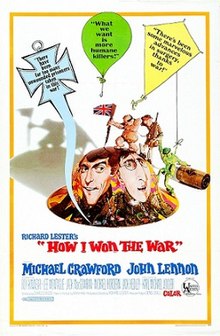
Band of Brothers is a 2001 American war drama miniseries based on historian Stephen E. Ambrose's 1992 non-fiction book of the same name. It was created by Steven Spielberg and Tom Hanks, who also served as executive producers, and who had collaborated on the 1998 World War II film Saving Private Ryan. Episodes first aired on HBO starting on September 9, 2001. The series won the Emmy and Golden Globe awards for best miniseries.

Richard Lester Liebman is a retired American film director based in the United Kingdom, famous for his comedic and campy tone style of shooting movies and for his work in both USA and UK cinema.
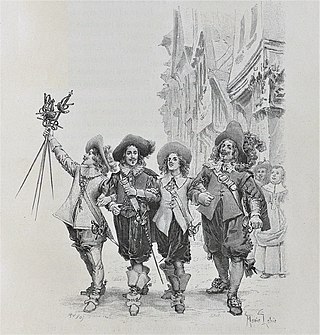
The Three Musketeers is a French historical adventure novel written in 1844 by French author Alexandre Dumas. As with some of his other works, he wrote it in collaboration with ghostwriter Auguste Maquet. It is in the swashbuckler genre, which has heroic, chivalrous swordsmen who fight for justice.

A musketeer was a type of soldier equipped with a musket. Musketeers were an important part of early modern warfare, particularly in Europe, as they normally comprised the majority of their infantry. The musketeer was a precursor to the rifleman. Muskets were replaced by rifles as the almost universal firearm for modern armies during the period 1850 to 1860. The traditional designation of "musketeer" for an infantry private survived in the Imperial German Army until World War I.
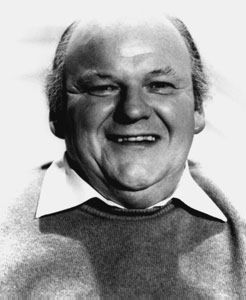
Roy Mitchell Kinnear was an English character actor and comedian. He was known for his acting roles in movies such as Henry Salt in the 1971 film Willy Wonka & the Chocolate Factory, Algernon in The Beatles' Help! (1965), Clapper in How I Won the War (1967), and Planchet in The Three Musketeers (1973). He reprised the role of Planchet in the 1974 and 1989 sequels, and died following an accident during filming of the latter.
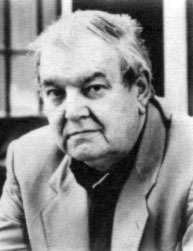
George MacDonald Fraser was a Scottish author and screenwriter. He is best known for a series of works that featured the character Flashman. Over the course of his career he wrote eleven novels and one short-story collection in the Flashman series of novels, as well as non-fiction, short stories, novels and screenplays—including those for the James Bond film Octopussy and an adaptation of his own novel Royal Flash.

Lieutenant Colonel John Masters, DSO, OBE was a British novelist and regular officer of the Indian Army.

Sgt. Franklin John Rock is a fictional character appearing in American comic books published by DC Comics. Sgt. Rock first appeared in Our Army at War #83, and was created by Robert Kanigher and Joe Kubert. The character is a World War II soldier who served as an infantry non-commissioned officer.
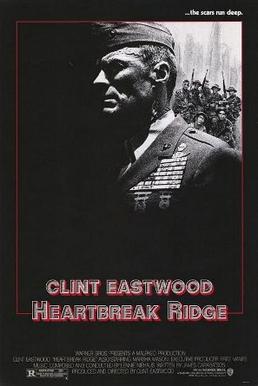
Heartbreak Ridge is a 1986 American war film produced and directed by Clint Eastwood, who also starred in the film. The film also co-stars Marsha Mason, Everett McGill, and Mario Van Peebles, and was released in the United States on December 5, 1986. The story centers on a U.S. Marine nearing retirement who gets a platoon of undisciplined Marines into shape and leads them during the American invasion of Grenada in 1983.

John Joseph MacGowran was an Irish actor, known for being one of the foremost stage interpreters of the work of Samuel Beckett, as well as his film roles as Professor Abronsius in The Fearless Vampire Killers (1967), Juniper in How I Won the War (1967), and Burke Dennings in The Exorcist (1973), in which MacGowran died during production.
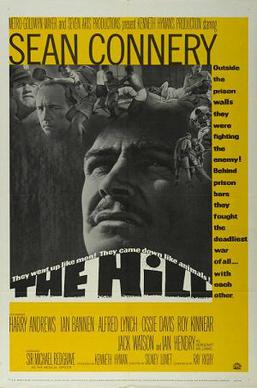
The Hill is a 1965 British prison drama film directed by Sidney Lumet, set in an army prison in North Africa during the Second World War. It stars Sean Connery, Harry Andrews, Ian Bannen, Ossie Davis, Ian Hendry, Alfred Lynch, Roy Kinnear and Michael Redgrave.

Line infantry was the type of infantry that composed the basis of European land armies from the mid-17th century to the mid-19th century. Maurice of Nassau and Gustavus Adolphus are generally regarded as its pioneers, while Turenne and Montecuccoli are closely associated with the post-1648 development of linear infantry tactics. For both battle and parade drill, it consisted of two to four ranks of foot soldiers drawn up side by side in rigid alignment, and thereby maximizing the effect of their firepower. By extension, the term came to be applied to the regular regiments "of the line" as opposed to light infantry, skirmishers, militia, support personnel, plus some other special categories of infantry not focused on heavy front line combat.
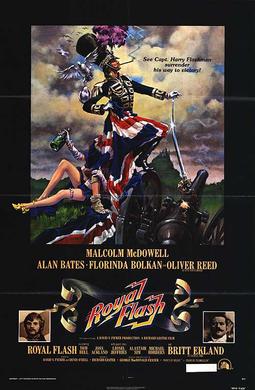
Royal Flash is a 1975 British adventure comedy film based on the second Flashman novel by George MacDonald Fraser. It stars Malcolm McDowell as Flashman. Additionally, Oliver Reed appeared in the role of Otto von Bismarck, Alan Bates as Rudi von Sternberg, and Florinda Bolkan played Lola Montez. Fraser wrote the screenplay and the film was directed by Richard Lester.

The Three Musketeers (also known as The Three Musketeers (The Queen's Diamonds)) is a 1973 swashbuckler film based on the 1844 novel by Alexandre Dumas. It is directed by Richard Lester from a screenplay by George MacDonald Fraser, and produced by Ilya Salkind. It stars Michael York, Oliver Reed, Frank Finlay, and Richard Chamberlain as the titular musketeers, with Raquel Welch, Geraldine Chaplin, Jean-Pierre Cassel, Charlton Heston, Faye Dunaway, Christopher Lee, Simon Ward, Georges Wilson and Spike Milligan.
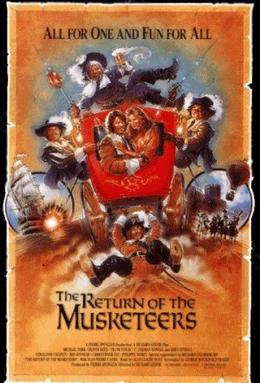
The Return of the Musketeers is a 1989 film adaptation loosely based on the novel Twenty Years After (1845) by Alexandre Dumas. It is the third Musketeers film directed by Richard Lester, following 1973's The Three Musketeers and 1974's The Four Musketeers. Like the other two films, the screenplay was written by George MacDonald Fraser.
The Howling Commandos is the name of several fictional groups appearing in American comic books published by Marvel Comics. The team also appears in the franchises developed for other media.
The Grip Weeds are an American rock band from Highland Park, New Jersey.
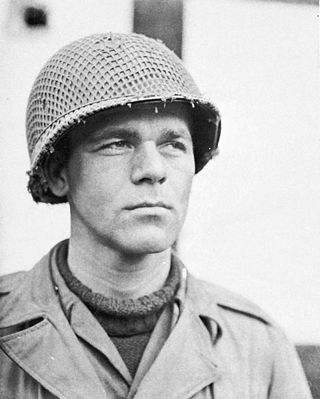
Karl Heinrich Timmermann was the first U.S. Army officer to cross the Rhine River in Germany during World War II after directing the assault across the bridge, helping remove explosive charges, and surviving the German Army's attempt to demolish the Ludendorff Bridge at Remagen on March 7, 1945.

Living Is Easy with Eyes Closed is a 2013 Spanish comedy-drama film written and directed by David Trueba, and starring Javier Cámara, Natalia de Molina, and Francesc Colomer. The film's title comes from a lyric in the song "Strawberry Fields Forever" by the Beatles.
The Liberator is an American adult animated war drama mini-series created and written by Jeb Stuart. It is based on the book The Liberator: One World War II Soldier’s 500-Day Odyssey by Alex Kershaw.
